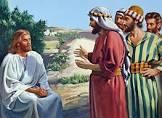
A recent television series, about the Boleyn family, showed how Queen Anne’s father, Thomas, clawed his way up through the court of Henry VIII, making an advantageous marriage and connecting with the right people. His ambition was fulfilled when he became close to the king, who then married his daughter. The disciples, James and John, seemed to think that God operated as an earthly monarch and power lay with whoever was closest to his Son. The other disciples joined in the fray, fearing they had missed out in the power struggle.
It is reassuring to see that those who lived in the presence of Christ still had all the human frailties that we share. When He asked the brothers whether they could drink the cup that he would drink, they cheerfully replied that they could. Probably they had no notion of what he was talking about. Gradually however, with God’s grace, they became faithful followers, who did indeed drink from his cup.
He gave them a vision of what being great really meant. His mother, Mary, in her Magnificat, talked about an alternative world where the lowly are raised high and those with plenty sent away. Mary had no illusions about herself: “For he hath regarded the lowliness of his handmaiden.” (Luke 1:48)
This was the kind of attitude that her son wanted his disciples to adopt: they were to be servants, not courtiers.